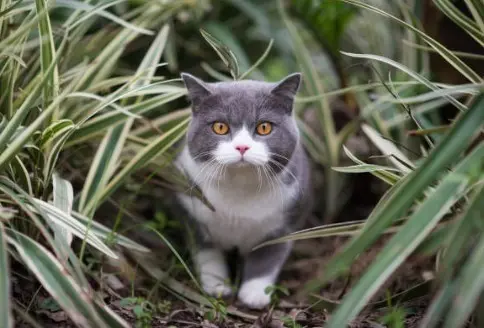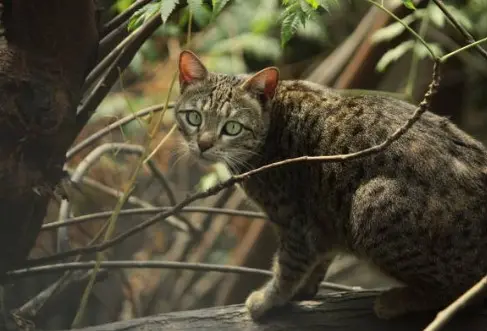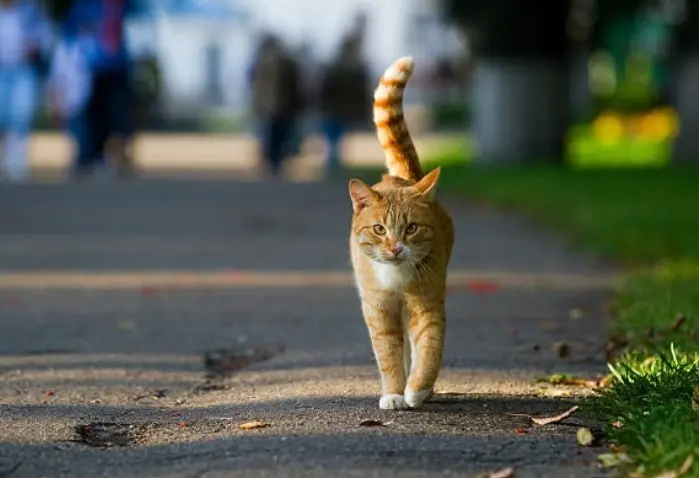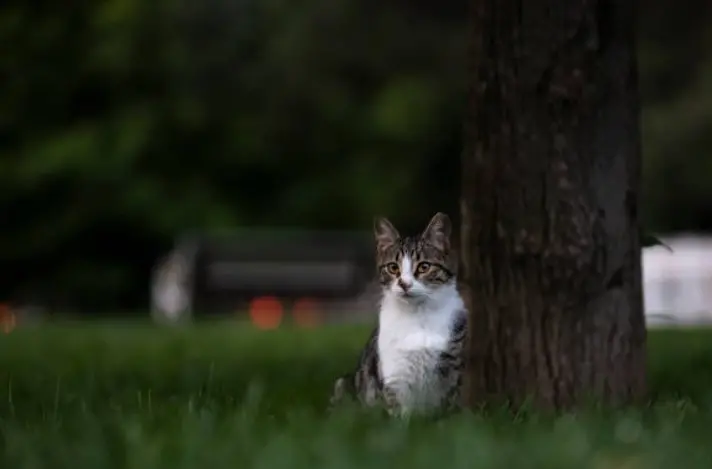Your cat knows what they want and they’ll do anything to convince you that they know what’s best. Unfortunately, if this includes staying outside at night, they are putting themselves at risk to numerous hazards, many of which are life-threatening. Your cat may consider sauntering through the great outdoors as being the ultimate feline adventure. However, outside threats lurk everywhere. Learn how to prevent your feline friend from experiencing serious harm by reading our recommendations for keeping your cat indoors at all times.

Cats are predators, right?
Although your cat’s wild ancestors roamed and hunted for their meals, they still faced considerable risk (e.g., fighting, becoming another animal’s dinner). In addition to the dangers their ancestors faced, domestic cats encounter modern hazards such as vehicles, busy roads, feral cat colonies, toxic substances, unleashed dogs, and animal abusers.
Cats’ wild ancestors lived outdoors because they had no other options, but today’s domestic cats enjoy unprecedented resource access and comfort within their home’s safe confines. Simply put, any benefit a domestic cat may derive from expressing their natural instincts outdoors does not outweigh the enormous risks. Much like you wouldn’t allow a child to be outdoors alone at night, you should exercise similar care with your beloved pet.
Risks abound: Outdoor dangers for cats
The dangers a cat encounters during their nighttime outdoor forays can range from minor to fatal. Because you are unable to monitor your cat’s activity once you let them out the door, you’ll never know how many threats your nocturnal feline faces on any given night. Your whiskered pals’ most prevalent outdoor dangers include:
- Disappearance — Many cats go missing and fail to return home. This risk is increased for a cat who is not microchipped or wearing a collar with tags that include your current contact information.
- Hit by a car — Because drivers are not able to see cats in the road at night, many of them commonly hit these nocturnal creatures, causing their death.
- Predators and fights — Cats may encounter other roaming stray or feral cats, dogs, or wildlife that perceive them as prey or a threat. If your cat becomes involved in a fight or is attacked, they can be seriously injured or killed.
- Illness and disease — A feral or unvaccinated cat can transmit disease to a domestic cat. Your whiskered pal can contract feline immunodeficiency virus (FIV) and feline leukemia (FeLV), life-altering and ultimately fatal diseases, if an infected cat bites them or they have close persistent contact with an infected cat. Other illnesses, such as upper respiratory infections, are spread via infectious airway secretions (e.g., tears, saliva, nasal discharge). In addition to cat-specific diseases, the deadly rabies virus can be transmitted via a bite from an infected wild animal or feral cat.
- Parasites — Roaming cats are susceptible to flea, tick, and mite infestations, and intestinal parasites. These pests are a nuisance and can transmit disease, often causing severe signs. Some parasites are zoonotic (i.e., transmissible from your infected cat to you and your family members).
- Wounds and injuries — Indoor-outdoor cats often return from their outdoor nocturnal adventures having sustained wounds and injuries resulting from fights, falls, and wildlife encounters.
- Toxin ingestion — Outdoor cats may encounter poison products and compounds, including ethylene glycol (e.g, antifreeze) or rodenticide (e.g., rat and mouse bait).
- Animal cruelty — Sadly, roaming cats frequently (may) become animal abuse victims.
Outdoor cats pose a threat to local wildlife
Outdoor cats frequently prey on birds and small mammals (e.g, chipmunks, rabbits, moles), which can damage local populations and affect biodiversity. Many conservation organizations urge cat owners to keep their feline friends indoors to protect their neighborhood ecosystems.
Safe alternatives to letting your cat outside at night
Although the indoor-only life seems like no substitute for Mother Nature as far as your cat’s contentment is concerned, many safe alternatives are available to help satisfy your feline friend’s instinctual drives. You can provide your cat with some outdoor time by offering the following:
-
-
- Catios — A catio is a cat-safe outdoor enclosure that allows your whiskered pal to enjoy the fresh air while facing no outdoor dangers. Catio size ranges from small portable enclosures to large permanent structures that may include vertical furnishings (e.g., trees, posts) for climbing and perching.
-
- Leash training — Well-socialized cats can be successfully trained to wear a harness and walk on a leash. If you can train your feline friend to leash walk, they can explore their world without running away or getting into trouble.
-
- Environmental enrichment — Upgrading your cat’s interior space can be a great way to bring the outdoors into your home. Provide your whiskered pal with vertical climbing structures such as cat trees, elevated hiding boxes or perches, scratching posts, play tunnels, and interactive toys such as feather wands and battery-operated mice. Install a bird or squirrel feeder outside your cat’s favorite window to provide them with visual stimulation.
-
- Mental enrichment — Engage your cat’s mind by offering them puzzle toys that encourage critical thinking and hunting skills. Cat-friendly mental enrichment toy options include reach boxes, snuffle mats, foraging toys, and motion-activated treat dispensers and balls.
-
Although allowing your cat to roam outside at night may seem like a kind act, doing so literally opens the door to innumerable heartbreaking hazards. The best way to satisfy your house cat’s need to explore, hunt, stalk, and pounce is to provide consistent indoor mental and physical enrichment and positive social interactions. Your whiskered pal will decide these fun indoor activities were their idea!
If your cat does get out and there are any signs of distress or trouble, UrgentVet is ready to help! Call, save your spot online or just walk-in – we’re here for you.



